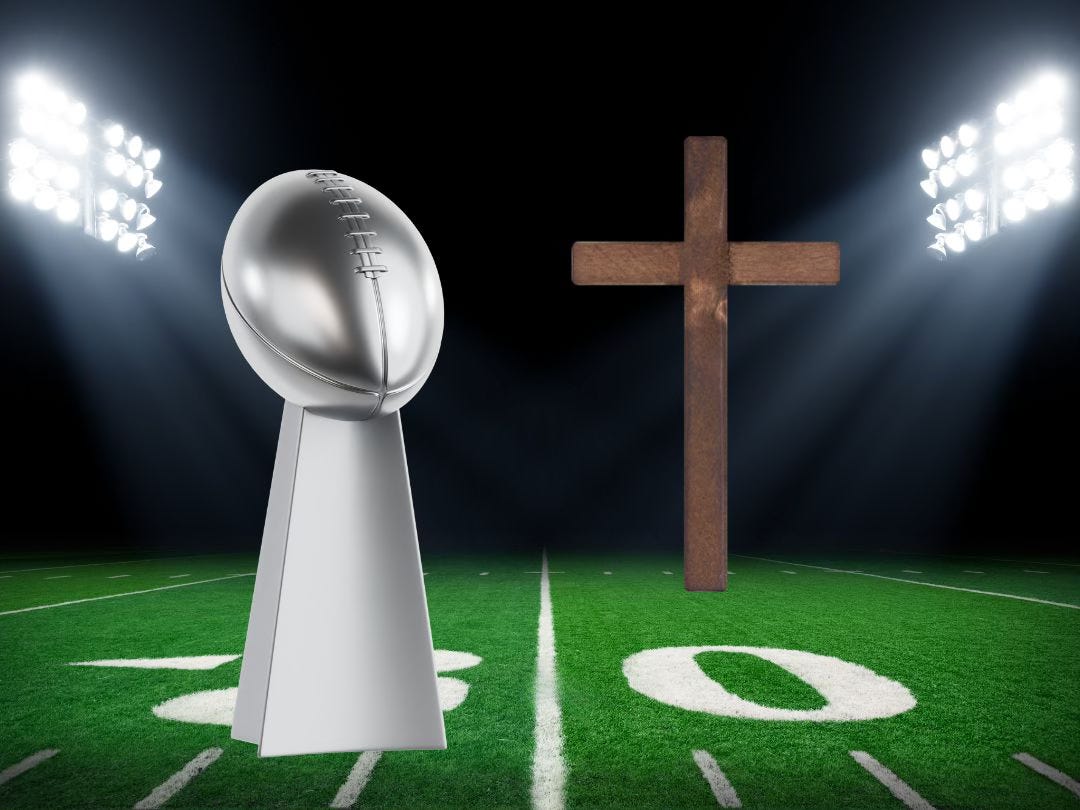
If it didn’t fall on the weekend, I’m fairly certain the Super Bowl would be passed into law as a national holiday.
You’ll have a few outliers. Friends who despise sports and will tell you all about it on social media before the big game. But most everyone else gathers together to celebrate this uniquely American spectacle. People will bring over food like it’s Thanksgiving. Friends and family will congregate like it’s Christmas. Whether your team is playing or not, you’ll still sit down to watch. It’s the biggest cultural event of the year.
The glory in winning it all
Why do we care? What’s the big deal?
I think we care because we’ve been trained to care about winning. From little league to youth travel sports, from middle school to high school, from college to the professionals—a good swath of the population is obsessed with sports and winning.
But we don’t just care about winning. We love the idea of winning it all.
Many of the most popular books and movies are about this. Our heroes have a dream or goal, and that dream must be fulfilled. They then battle through obstacles and often come to the edge of defeat, but ultimately prevail.
The athletes we’re sitting down to watch on Super Bowl Sunday have this hero status, at least for a while. There are fewer feel-good experiences than seeing someone overcome all odds to finally reach the top of the mountain.
This ethos, of course, doesn’t just drive how we see sports. It’s ingrained into almost every other pocket of life as well: in the person who goes to school hoping to graduate and start a career; in those who seek to rise higher in their field or succeed as entrepreneurs. In marriage. Parenting. Getting in shape. We all have goals and dreams, and ultimately, we want to win it all.
Most of us look to models of success when seeking to achieve these things. Professional athletes. Rich power magnets or politicians. Famous authors or celebrities. Like those Super Bowl champions, we celebrate these people and wonder how we might reach the top of the mountain, too.
Touchdown Jesus

Many sports fans are familiar with the mural on the campus of Notre Dame: “Touchdown Jesus.” Painted on the side of the campus library, the mural is actually called “Word of Life” and is a celebration of Jesus reigning over all who pursue knowledge. But fans at Notre Dame will say his upraised arms are more like a referee confirming a touchdown. Jesus seems to approve of our desire for ultimate victory.
Jesus did indeed care about victory and winning it all. But unlike the culture that constantly sought its own glory, Jesus knew he could only win it all by losing it all. Instead of defeating his opponent through his divine power and force of will, he achieved the victory of eternal life for you and me by first dying on the cross in ultimate defeat.
As one of his followers, Jesus calls me to follow this same countercultural path to victory.
“Whoever wants to be my disciple must deny themselves and take up their cross and follow me. For whoever wants to save their life will lose it, but whoever loses their life for me will find it. What good will it be for someone to gain the whole world, yet forfeit their soul?’” (Matthew 16:24-26)
The path to victory Jesus offers isn’t just countercultural. It flies in the face of my basest instincts. He says if I want to be exalted, I need to live a life of humility. He says the only way to find true strength is by admitting my weakness. The only way to achieve my destiny is to live my life for God and others.
So. What to do? Is God telling me to shut off the TV and never watch the Super Bowl? Is he saying I should disdain sports, ambition, the drive to improve and compete? That I should avoid this evil world and hide out in my home or church like a monk, waiting for heaven?
No. He’s not.
To explain, let me start by sharing my own recent sporting adventure.
Championing each other

Like so many around the country, I joined the pickleball craze last year. The relatively low-intensity dynamics in the game have been perfect for someone like me: an out-of-shape, aging, non-athletic fellow who needed a reason to get moving again.
While there are certainly competitive, advanced, and even professional pickleball leagues, the vast majority of players I’ve met are more like me—wanting a fun form of exercise where they can meet new people and simply enjoy the privilege of playing the game.
Do I like to win? Sure. But I’d rather have a longer game and lose than win all the time. The sport has given me a vehicle to want to improve: improve my body and conditioning so I can minimize injury; improve my playing skills; improve my social skills in adapting and showing kindness to a wide variety of skill levels and ages.
The joy of pickleball for me hasn’t been so much about seeking to rise to the top and win it all, singing, “We are the Champions!” It’s been about joining a culture of diverse people who love the play and competition, but mostly want to champion each other for seeking to improve and showing up to play at all.
The trophy and the cross
Sports and competition are certainly not evil. They embody many healthy principles we should celebrate: the value of moving your body, discipline and hard work, going beyond what you think you can do to accomplish your goals. Sports teach us the value of teamwork, self-sacrifice, and community.
Having said that, there are also a number of things wrong with sports these days: ruthless ambition, greed, and the desire for personal glory, to name a few. But the point of following Jesus isn’t to avoid what’s wrong with the world. It’s to redeem it. To—with God’s power and guidance—make it into something new that glorifies God and demonstrates his love for you and me.
You can be sure there are those playing and coaching in the Super Bowl with this in mind. Do they want to win it all? I’m sure they do. But I suspect they sought to reach this championship not by living for themselves, but by championing God and every person they’ve met along the way. They’ve chosen to work hard while showing kindness to those who struggle. They’ve sought to be the best while relying on God’s strength and guidance to get them there.
As followers of Jesus, we don’t have to forgo the thrill of competition and desire to win. We just need to remember that our ultimate victory isn’t exemplified by the Lombardi trophy, which, like all manmade trophies, is fleeting and will one day be forgotten. Our ultimate victory is found in the cross—the symbol of supreme sacrifice and love where eternal victory has been won through a temporary defeat.
This Super Bowl Sunday, I’ll be meditating on this profound truth over a plate of buffalo wings.
What are your thoughts? Do you love sports? Hate sports? Have you tried to integrate the values of your faith into watching or playing? Join in on the conversation.




As usual John, very well done! I totally agree ☺️